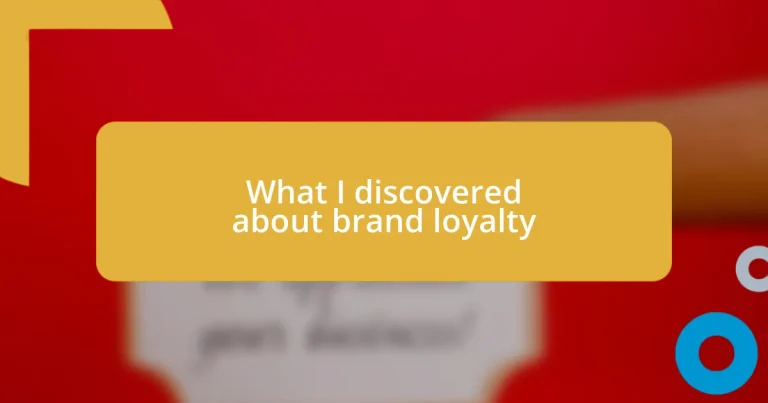Key takeaways:
- Brand loyalty is built on emotional connections, trust, and shared identity, influencing consumer preferences and behaviors.
- Factors such as personalized communication, community engagement, and consistent quality are essential for fostering and maintaining brand loyalty.
- Measuring brand loyalty involves qualitative feedback, tracking repeat purchases, and analyzing online engagement metrics to assess customer attachment.
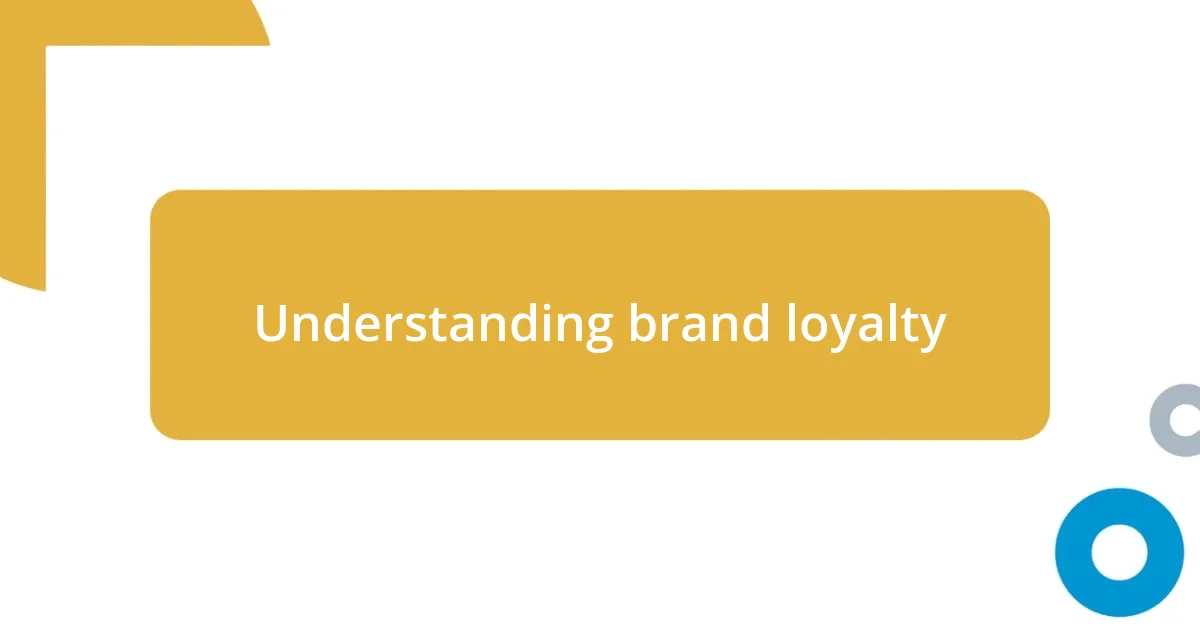
Understanding brand loyalty
Brand loyalty goes beyond mere preferences—it’s an emotional connection. I recall when I switched to a brand of running shoes that not only fit perfectly but felt like they understood my need for comfort during long runs. Can a shoe make you feel understood? In my experience, yes, it can.
Understanding brand loyalty also means recognizing how trust plays a vital role. I remember a time I had a bad experience with a product from a well-known brand. Despite their stellar reputation, my trust wavered. That incident taught me that loyalty can be fragile; it flourishes when brands consistently deliver value and engage their customers authentically.
Additionally, brand loyalty often stems from a shared identity. When I wear my favorite sports gear, I feel like part of a community, one that shares my values and lifestyle. Isn’t it fascinating how we can feel a sense of belonging just because of a logo or a brand message? It reinforces the idea that brand loyalty is less about the product itself and more about the feelings and sentiments it evokes.
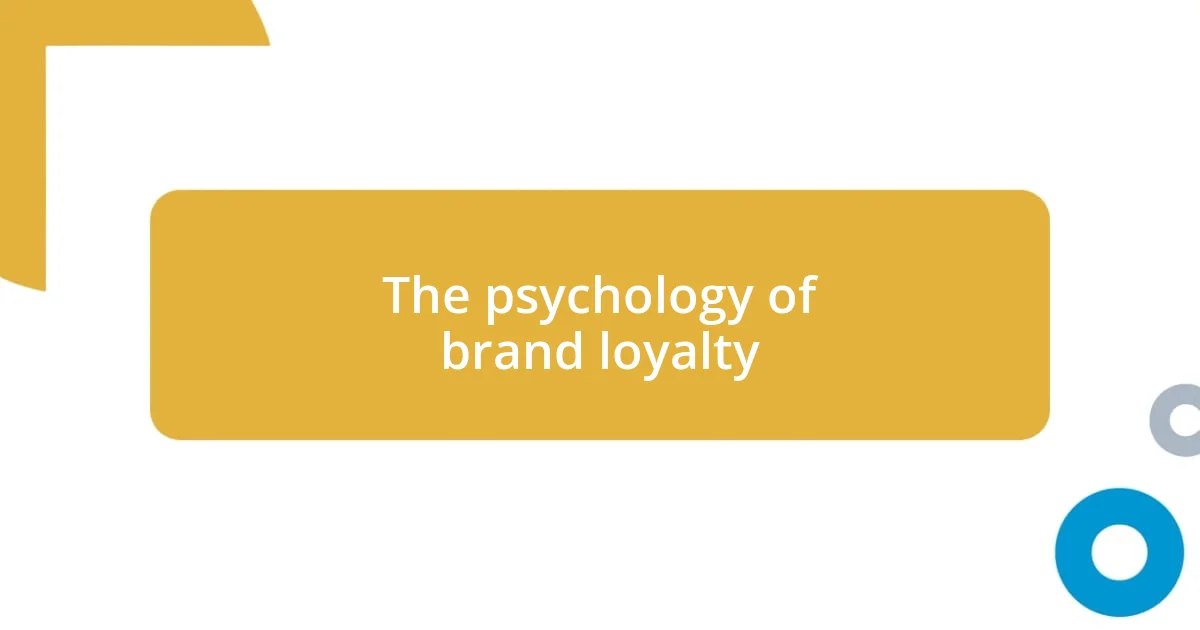
The psychology of brand loyalty
Brand loyalty is intricately tied to our psychological needs. From my perspective, it’s fascinating how our brains create emotional attachments to brands, often subconsciously. For instance, thinking back to my first smartphone purchase, I remember the excitement and sense of pride it brought me; it wasn’t just a tech device but a status symbol that boosted my confidence and connected me with a broader community of users.
- Emotional Connection: Brands evoke feelings, creating bonds that resonate with our identity.
- Trust: A single negative experience can shake the foundation of loyalty, highlighting how trust must be nurtured.
- Social Influence: We often choose brands based on recommendations from friends, seeking validation and a sense of belonging.
- Perception of Value: The value we perceive isn’t just monetary; it encompasses the experience and satisfaction we derive from the brand.
Reflecting on these factors, I often think about how a particular brand of coffee makes my mornings not just enjoyable but special. The aroma reminds me of cozy gatherings with friends, turning an everyday ritual into a cherished experience. These subtle nuances lay the groundwork for genuine loyalty, which isn’t merely transactional—it’s deeply personal and emotional.
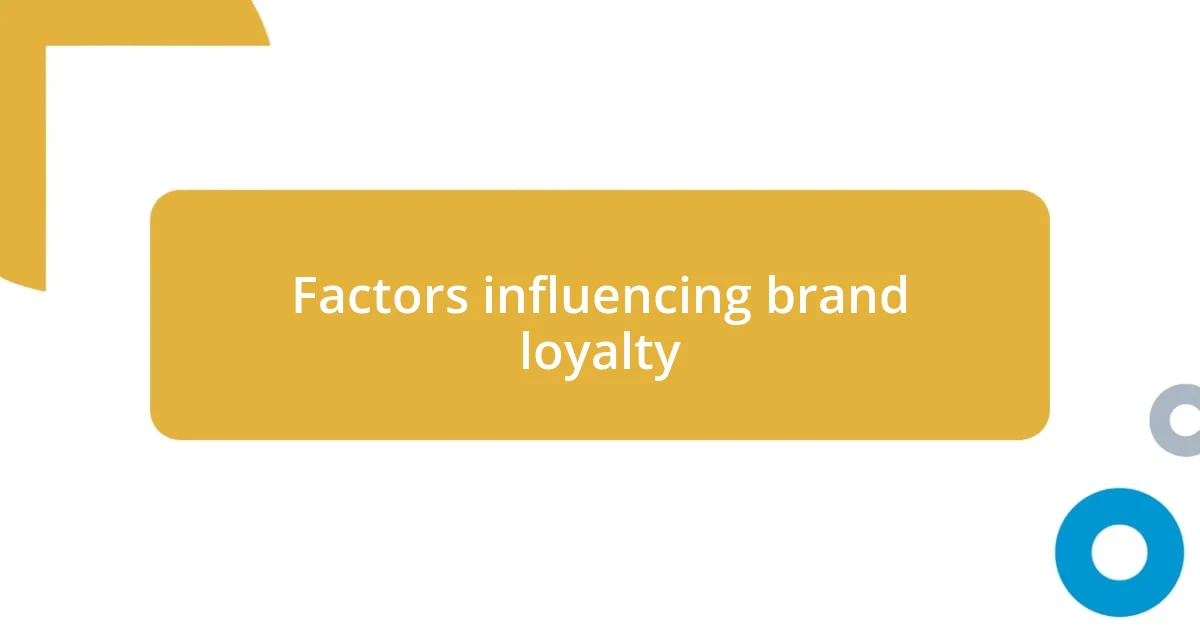
Factors influencing brand loyalty
Brand loyalty can be significantly influenced by the emotional connections we forge with brands. For instance, I remember the excitement I felt every time I opened a particular brand of makeup that reminded me of my mother’s beauty routine. The scents, packaging, and even the colors evoke memories of her teaching me to appreciate self-care. It’s intriguing how these emotions can turn a simple product into a cherished item that you earnestly seek out and prefer over others.
Additionally, trust is a crucial factor in maintaining brand loyalty. Reflecting on my experiences, I think about that time I received a disappointing online order from a once-favored company. Despite their previous reliability, it felt as though a veil had lifted, revealing their flaws. Trust is delicate; while it can be built with consistent positive interactions, it only takes one disappointing moment to create doubt. This fragile balance is what keeps brands striving to fulfill customer expectations continuously.
Lastly, the influence of social circles cannot be understated. When I was searching for a new fitness tracker, I turned to friends for recommendations. Their testimonials about a specific brand not only guided my decision but also made me feel part of a community that values fitness. I realized how social proof creates a sense of safety and belonging around our choices—ensuring that we stick with brands that resonate with our social identities.
| Factor | Example |
|---|---|
| Emotional Connection | The nostalgic feel and memories tied to a brand can create lasting preferences. |
| Trust | Negative experiences can shatter loyalty even with previously well-regarded brands. |
| Social Influence | Recommendations from friends can significantly shape brand choices and loyalty. |
| Perceived Value | Value goes beyond price, encompassing the experience and satisfaction associated with a brand. |
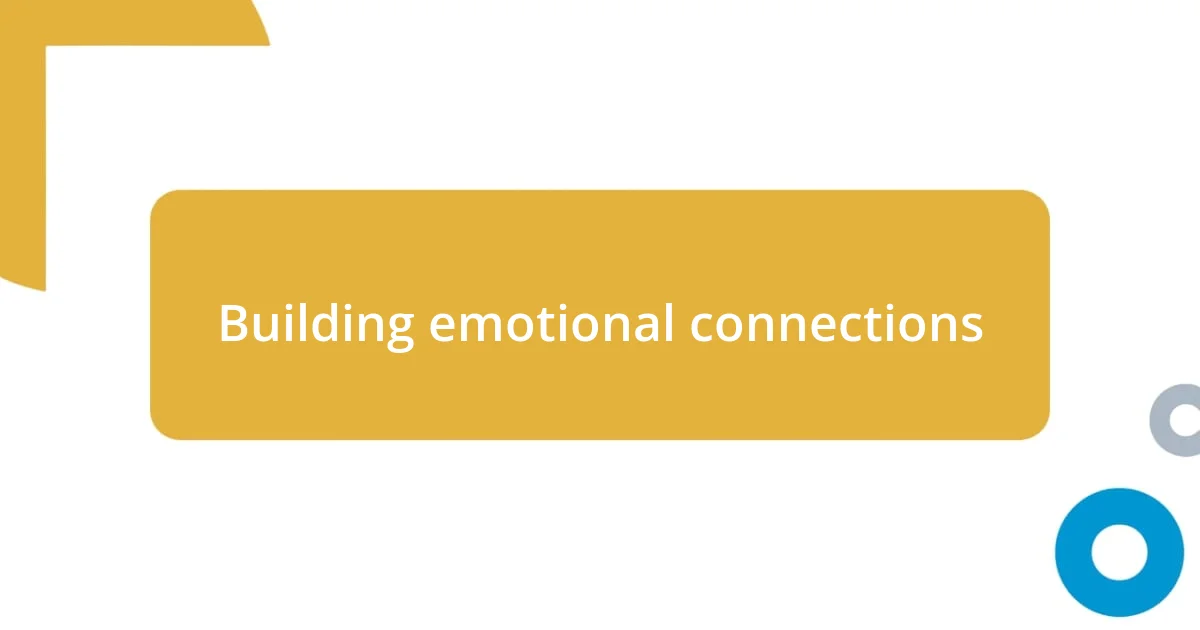
Building emotional connections
Building emotional connections with brands is all about resonance and shared experiences. I recall a time when I discovered a clothing brand that not only matched my style but also aligned with my values on sustainability. Each piece I bought felt like more than just an addition to my wardrobe; it was a statement about who I am and what I stand for. Can you think of a brand that makes you feel similarly connected?
There’s something magical about how a brand can evoke strong feelings that are tied to our personal narratives. One evening, while sipping my favorite herbal tea, I stumbled upon a brand that reminded me of childhood evenings spent with my grandmother. That simple experience turned into a moment of deep reflection. The warmth of those memories transformed a mundane ritual into something profoundly meaningful. It’s fascinating how these connections can influence our loyalty to a brand.
Ultimately, these emotional ties create a community around the brand. When I see someone wearing a jacket from that sustainable brand I love, it’s like a nod of recognition, a shared understanding of values. It’s not just about making a purchase; it’s about connecting with others who feel the same passion. Isn’t it interesting how these emotional connections really shape our choices? Each decision feels more like joining a family that shares our beliefs and experiences, reinforcing loyalty in a way that feels genuine and automatic.
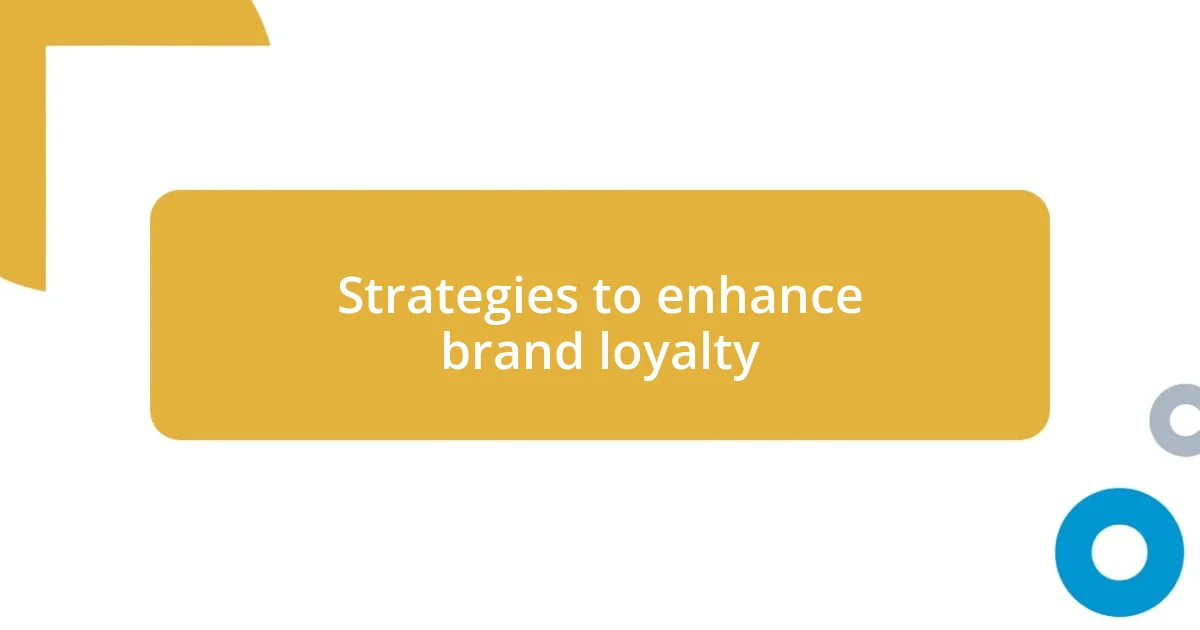
Strategies to enhance brand loyalty
One effective strategy to boost brand loyalty is personalized communication. I remember when I received a handwritten thank-you note from a small business after my first purchase. It made me feel truly valued as a customer, and I appreciated the effort they put into my experience. This simple act not only made me more likely to return, but it also transformed my perception of the brand into one that truly cares about its customers. Have you ever encountered a brand that made you feel special in a similar way?
Another vital component is creating a sense of community among customers. I’ve participated in various brand-hosted online events, where I connected with other fans and shared our experiences. This communal atmosphere fostered a deep sense of belonging and encouraged us to stay loyal to the brand. It’s fascinating how these connections can be just as important as the products themselves, isn’t it?
Moreover, consistently delivering quality experiences can’t be overlooked. A few years ago, I tried a subscription service that initially impressed me, but after a few months of subpar products, my excitement faded. I realized quickly that loyalty requires reliability; a brand must continuously meet and exceed expectations. It’s a reminder that maintaining loyalty is a journey that involves ongoing commitment and exemplary service. What brands have you found worth sticking with because they’ve consistently delivered?
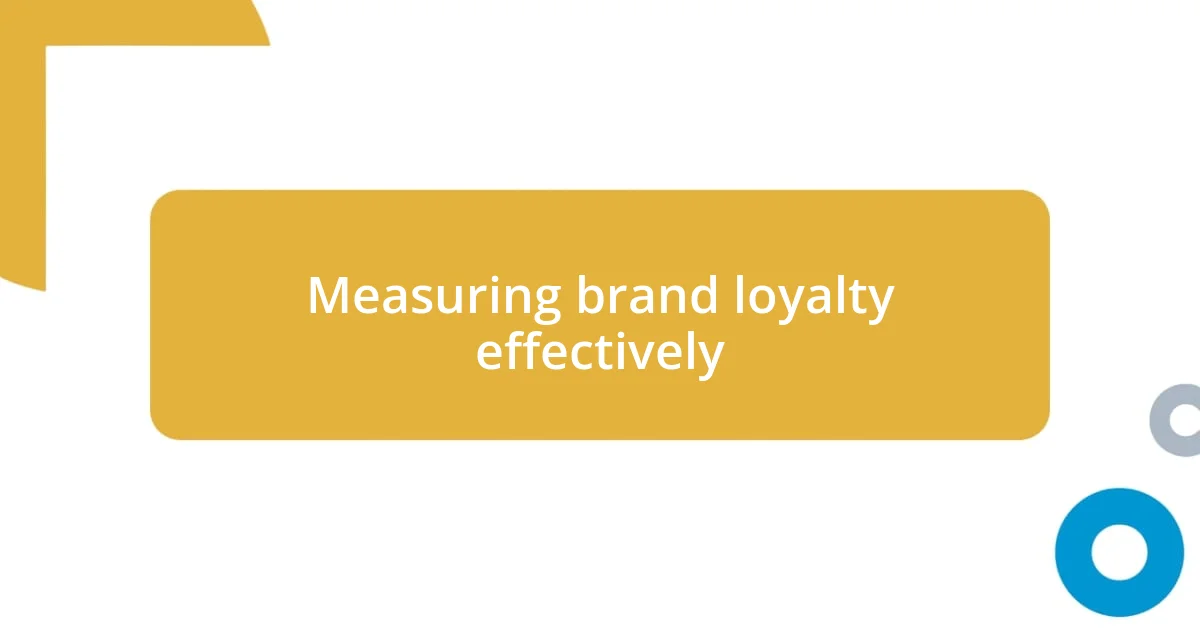
Measuring brand loyalty effectively
Measuring brand loyalty effectively involves utilizing both qualitative and quantitative metrics. For instance, I remember participating in a brand’s survey after making a purchase. The emphasis they placed on my feedback made me realize that my opinion mattered. Surveys like these can provide invaluable insights into customer satisfaction and unearth what truly drives loyalty.
Another way to assess loyalty is through tracking repeat purchases. One time, I found myself gravitating back to a particular coffee shop, not just for their steaming brews but the way they remembered my order. This kind of repeat behavior speaks volumes about my attachment to the brand. By analyzing purchase frequency and customer retention rates, businesses can gauge their loyalty levels accurately.
Finally, online engagement metrics are crucial nowadays. I often find myself following my favorite brands on social media and actively engaging with their content. High levels of interaction, like comments and shares, indicate a strong emotional connection. How often do you engage with brands you love? These interactions help brands see their commitment reflected in real-time, providing a clear measure of loyalty.
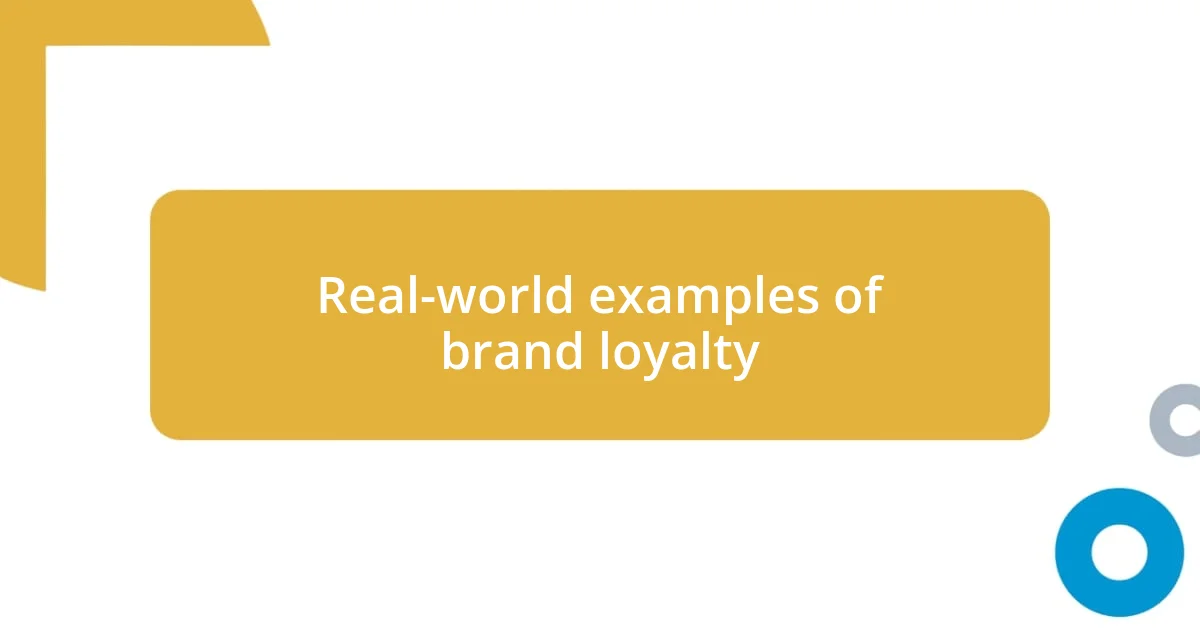
Real-world examples of brand loyalty
It’s intriguing how brand loyalty manifests in everyday life. I’ve been a loyal Apple user for years, not just because of their sleek designs, but because I feel part of a community that shares a passion for innovation. I remember the excitement I felt when I finally upgraded to the latest iPhone. The experience wasn’t merely about the product; it was tied to the anticipation and pride of being in this exclusive club. Have you ever felt that thrill of unboxing a new gadget from a brand you trust?
Another strong example of loyalty is seen with Starbucks. I’ve often noticed that as I walk into my local store, the barista immediately greets me by name and even remembers my usual order. That personal touch creates an emotional connection, making me want to continue my coffee ritual there rather than elsewhere. It’s fascinating how such simple interactions can forge a bond, don’t you think?
Let’s not overlook Nike, either. Their campaigns often resonate on a deeper level. I recall the impact of their “Just Do It” slogan during my college workouts. It inspired not just me, but countless others, to push our limits. That emotional motivation transformed a mere athletic brand into a source of personal empowerment for many. Have you experienced a brand that inspired you to become a better version of yourself?












